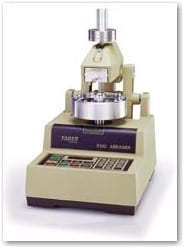The Taber® Multi-Media Particle Abrasivity Testing Attachment provides additional flexibility for the Taber® Models 5130/5131 and 5150/5151 Abrasers.
It is available as a separate attachment or premounted on the single or dual Taber® Abrasers.
The Model 5500 is designed to measure the abrasivity of virtually any fluid, semi—solid, or powder. Typical applications include paints, pigments, adhesives, sealants, epoxies, pastes, dental powder, detergents and industrial additives… to mention just a few.
The Model 5500 employs a proven weight loss testing method. The medium to be tested is placed in the testing dish, where three brass pins rotate in contact with a stainless steel wear disc. The powder, fluid or semi—solid between them acts as an abrasive and causes wear.
The weight loss of the brass pins is measured after each test and provides an accurate comparison of abrasion rates of different media. The test can be easily customized to suite specific requirements.
The Model 5500 features an adjustable gearbox with two standard drive ratios for testing a wide variety of media. The optional Hi/Lo gear set provides even greater flexibility. A heated specimen dish is available, as an option, for simulating elevated temperature conditions.
Ask for Price

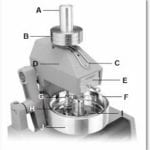
A. Splined Shaft
B. Weight Discs
C. Lifting Handle
D. Detachable Head
E. Adjustable Gear Box
F. Disposable Dish Insert
G. Pin Holder
H. Brass Pins
I. Stainless Steel Wear Disc
J. Aluminum Specimen Dish
| Description | Quantity |
| Stainless Steel Wear Discs | 3 |
| Brass Pins | 60 |
| Weights, 250 g | 3 |
| Plastic Dish Insert | 1 |
| Spill Tray | 1 |
| Hex Wrench | 1 |
| Disc Removal Tool | 1 |

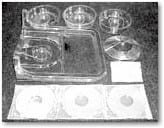
The load and pin holder speeds are adjustable, allowing the testing of a wide range of material viscosities. The standard testing load on the brass pins can be varied incrementally, from 250 g to 1,000 g. The optional weight discs (250 g each) allow the load to be increased to 2,500 g.
The rotational speed of the specimen dish is dependent upon the Taber® Abrader, either 60 rpm with 230 VAC models, or 72 rpm with 115 VAC models. Additionally, changing the gearing allows the speed of the pin holder to be altered. The Hi/Lo gear set (optional) provides even further flexibility.
| Color Code | Gear Set Up | Drive : Driven Ratio | Pin Holder RPM (115 VAC) | Pin Holder RPM (230 VAC) |
| Orange | Standard | 0.9 : 1.0 | 65 | 54 |
| Yellow | Reversed | 1.0 : 0.9 | 80 | 67 |
| Red (optional) | Standard | 0.6 : 1.0 | 42 | 35 |
| Green (optional) | Reversed | 1.0 : 1.7 | 123 | 103 |
The choice of gears is dependent on the material being examined, the more abrasive or viscous, or the larger the particulate size, the more resistance the media presents, hence the lower—slower the optimal drive ratio speed. A basic guide is suggested below, although each arrangement should be modified to suite a specific application.
Orange — Used to create a base line, for testing most materials.
Yellow — A 23% increase in speed over the standard. Reduce the total number of cycles, reduce the ‘fluid wave’ in front of the rotating pin holder, level the media as it passes the pin holder.
Red — 0.6:1.0 is slowest speed. When specimen loading increases to 1,750 g or greater, it is necessary to run at this speed to supply adequate torque to rotate the pin holder in order to maintain a constant speed.
Green — A 290% increase in speed over the standard. This is used for ‘low percent by volume’ particulate concentrations and the ‘rate of wear’ may be insignificant over an extended number of cycles.
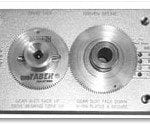
Hi/Lo Gear Set [P/N 129832]
The optional gearing provides a greater range of testing speeds. This accessory is recommended for specimen loadings greater than 1,750 g, or where there is low percent by volume particulate concentration in the medium.

Replacement Brass Pins [P/N 130352]
The premium quality grade of brass used to manufacture these pins virtually eliminates any variation from material. Available in packages of 60.

Additional Weight Discs [P/N 130285]
The standard minimum load for the Multi-Media Abraser is 250 g. Three 250 g weight discs are included, allowing the load to be increased to 1,000 g. Additional 250 g weight discs are available, allowing an increase of the load to 2,500 g, the maximum allowable.
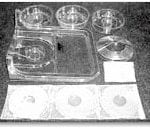
Consumable Items
Taber offers the following replacement parts for your Taber Multi-Media Abraser:
- Plastic Spill Tray [P/N 129756] — replacement tray protects the Abrader from spills;
- Plastic Dish Cover [P/N 130601] — replacement cover reduces tray evaporation;
- Disposable Dish Inserts [P/N 130602] — replacement inserts provide convenient test cleanup;
- Stainless Steel Wear Discs [P/N 130353] — replacement wear discs.
- Aluminum Dish [P/N 130309] — replacement aluminum dish with handle;
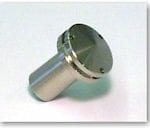
Pin Holder [P/N 129752]
Replacement Pin Holder for the standard brass pins.
Flat Testing Head [P/N 130315]
The Universal Holder permits testing your own materials against the stainless steel wear disc. The user selected media (liquids, pastes, gels, powders in suspension, semisolids, etc.) act as the abrasive media.
Please visit the Taber® Instrument Accessories,Taber® Abrasive Media, and the Taber® Specimen Holder pages for more information regarding available accessories that further broaden the testing capabilities of the Taber® Abrasers.
Taber Abrasion Tester, Taber abraser, abraser, Taber, abrasion, abrasion tester, abrasion test, Taber abrader, Taber Method, abrasion resistance, laminates, paper, cardboard, paper board, thermosetting resins, laminate floor covering, resilient floor coverings, wood and parquet flooring, flooring, elasticity, resistance to wear, melamine, particle board, rubber coated fabric, plastic coated fabric, coated fabric, abrasive wheels, rubbing, paint, varnish, Frick Taber Test, textiles, laminar flow, decorative laminates, glazed ceramic, unglazed ceramic, dimension stone, transparent plastic, rotary platform abrader, powder coatings, polymeric powder, wall coatings, organic coatings, pile retention, protective coatings, mar resistance, scratch resistance, grit feed method, copiers, printers, ink, thermal spray coatings, film, marking, bar code, aminoplastic resins, cloth, foil, anodized aluminum, scuffing, upholstery, anodic oxidation, bodycloth, snagging, bearding, fiber loss, HPL, glazing, safety glazing, 85.060.

